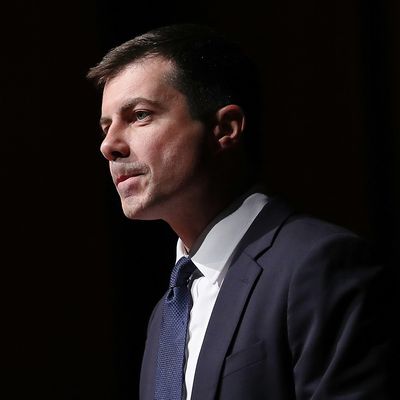
If you are a 37-year-old pol with a mixed record as mayor of the 305th-largest city in America running for president against six sitting United States senators and a front-runner who entered the Senate a decade before you were born, you will need to make a virtue of being a young outsider. Pete Buttigieg is going beyond making the defensive case that he’s not too young or inexperienced for the job; he’s turning it into a positive electability argument. Here’s how he put it to GQ’s Jason Zengerle:
“Every time Democrats have succeeded in the last 50 years, it’s been with a new-generation figure who’s not been marinating in Washington for a long time,” he told me. “Every time we’ve tried to go with the kind of safe, established, been-here-for-a-long-time kind of figure, we have come up short. This isn’t just a pattern. This is an iron, unbroken law going back to the ‘60s.”
Now there’s some chutzpah, folks. No wonder Zengerle’s piece is titled “The Audacity of Pete Buttigieg.”
But how about his historical claim? To begin with, the ranks of Democratic presidential winners in the last 50 years is a classic small sample: Jimmy Carter, Bill Clinton, and Barack Obama. If you go back another 50 years, there are four Democratic presidents, three of them U.S. senators (LBJ, JFK, and Truman), and the fourth, FDR, a veteran of national politics who had been assistant secretary of the Navy under Woodrow Wilson. Buttigieg does not offer any particular reason to make 1969 the crucial year when being a Washingtonian stopped being an asset and started violating an “iron, unbroken law.”
The three predecessors he does claim had things going for them beyond being young, inexperienced, and from outside Washington.
Carter ran for president at the precise moment in history where it again became possible and advantageous for a white, Deep South Democrat to take the plunge. He became nationally popular by slaying the dragon of George Wallace’s terrifying candidacy, and then narrowly won the presidency mostly because he was uniquely able to lash together a coalition of liberals and conservatives that included former civil-rights workers and career racists (including Wallace) to sweep the South and southern-inflected areas. He was 51, not all that young, and had served in statewide office.
Obama, of course, was a U.S. senator (albeit a freshman), but being relatively young and inexperienced was not the most prominent thing about his candidacy: Like Carter, he had an identity advantage that turned out to be crucial.
And yes, Clinton was a governor, but by the time he ran for president he was quite well-known in national political circles. In 1990, I wrote a speech for my then-boss Sam Nunn introducing Clinton as “the first politician to become a bright, rising star in three different decades.” It got a big laugh because it was true.
The context in which these “outsiders” got into the White House mattered, too. Carter and Clinton ran against incumbent presidents who were struggling through tough economic times; Carter had the additional edge of running after Watergate had tainted Washington and the GOP. Obama’s opponent, John McCain, another longtime Washington veteran, was famously about as different from Donald J. Trump as another white Republican could possibly be.
None of this is to deny there is a kernel of truth in what Buttigieg said. All other things being equal, getting one’s experience in politics and government outside Washington can be a positive, particularly for those in what is often perceived as the “party of Big Government.” Carter, Clinton, and Obama definitely took advantage of their backgrounds and the Washington pedigrees of their rivals. And Buttigieg has some other things in common with past winner: his own claim to a “historic” identity as the first viable openly gay presidential contender, a connection with a crucial midwestern battleground region, and his obvious charm and intelligence.
Still, Mayor Pete should be careful with this “iron, unbroken law” language. If he loses the nomination battle to one of his senatorial (or vice-presidential) rivals and is out there campaigning for the winner, as he surely will, it’s the sort of, well, audacious remark that could come back to haunt him.






























